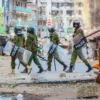Molly Manning, Contributing Writer
Project Gabriel: President’s Special Commission on Slavery and Justice released by VCU in September 2023 is an effort to “report, reconcile and heal the wounds caused by VCU’s historic ties to the institution of slavery,” according to its website.
The first commission meeting was held on Jan. 26, 2023 to discuss implementation, according to Project Gabriel, and a recent discussion on Oct. 22 allowed experts and community members to share their thoughts.
The commission bears the name of an enslaved blacksmith in Henrico who crafted a plan for a rebellion in August of 1800, according to PBS. VCU also renamed its African American Studies building in his honor in 2022, according to VCU.
The October public panel discussion featured chair of the African American studies department Shawn Utsey as well as Sesha Joi Moon, executive director of the JXN Project and former Richmond City Council member Chuck Richardson, according to VCU News.
The discussion provided a space for these individuals to share their thoughts about addressing historical racial injustice and the initiatives being taken now throughout the community to not only provide monetary reparations but also the healing and moral reparation necessary to move forward, according to VCU News.
Project Gabriel follows a state law passed in 2021, the Enslaved Ancestors College Access Scholarship and Memorial Program.
This law requires five of Virginia’s oldest universities to identify and memorialize enslaved individuals who were responsible for building the institutions and providing benefits to individuals or communities with connections to slavery, according to Project Gabriel.
It also requires these higher education institutions to continue reparation efforts for either as many years as the school used slavery or until they disburse scholarships to the number of students equal to the number of enslaved people who worked there, according to Axios.
VCU President Michael Rao commissioned a report shortly following the law’s passage titled “Slavery and the Medical College of Virginia: A Report for Virginia Commonwealth University.” The report was led by Jodi Koste, Ph.D. and Peter Wosh, Ph.D, archivists at VCU and New York University, which found that MCV was built using slave labor since its inception, according to Project Gabriel.
Project Gabriel recommends that VCU awards five to eight minimum “Gabriel Scholars” following the guidelines of the Enslaved Ancestors College Access Scholarship and Memorial Program for at least the 27 years that the school used enslaved labor, according to VCU News.
The project also recommends that VCU provide “wrap-around” services to ensure success after the Gabriel Scholars graduate.
Project Gabriel recommends that VCU work on the restoration of the First African Baptist Church on the MCV campus and use the space as a memorialization site for enslaved people who worked there. VCU has not yet determined the names or exact number of those individuals, according to VCU News.
There are also recommendations centered around the Richmond community outlined in the commission, such as working with community organizations and partners to support workforce development as well as other community needs, according to VCU News.
Some aspects of community development suggested include providing summer internships as well as mentor programs and other college readiness programs for youth in the community with an emphasis on those in Richmond Public Schools, according to VCU News.
VCU PR stated in an email that there are no current updates on the commission or its implementation at this time.
Shawn Utsey, chair of the VCU Department of African American Studies and VCU professor, said that most institutions in the antebellum South relied heavily on slave labor to not only build but to run and maintain them.
Utsey also shared the importance of acknowledging the medical colleges’ use of Black cadavers stolen from cemeteries in order to become the well-known medical center that it was at the time and is today.
“I think people are clearly enjoying the spoils of slave labor, and VCU is enjoying the status that comes from the resources they have been able to accumulate built upon their reputation as a medical center with cutting edge technology, cutting edge faculty, really extending from their exploiting Black bodies during the antebellum period,” Utsey said.
Even post-emancipation, the school stole the heart of a Black man named Bruce Tucker for a heart transplant surgery as detailed in a book about the theft, “The Organ Thieves” by Chip Jones, which was the 2022 Common Book for first-year VCU students.
“It’s impossible to calculate the harm done to the family, but also the benefit to the university,” Utsey said.



